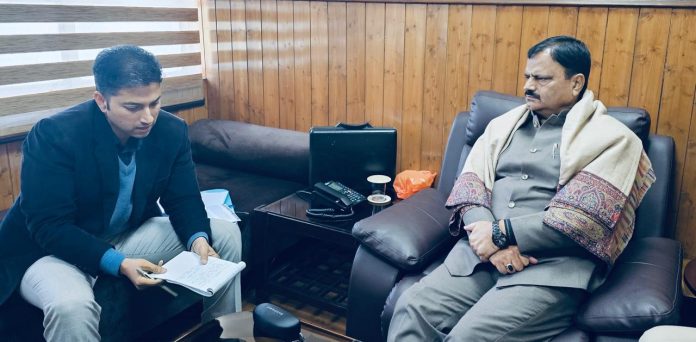JAMMU, Dec 24: In a significant move towards empowering tribal communities and ensuring inclusive development, Minister for Jal Shakti, Forest, Ecology & Environment and Tribal Affairs, Javed Ahmed Rana, has approved a key departmental proposal for inclusion of newly notified tribes in Jammu and Kashmir under various tribal welfare schemes.
The Minister asked the Secretary, Tribal Affairs Department, Prasanna Ramaswamy G and Director, Tribal Affairs J&K, Ghulam Rasool and other senior officers to focus on expediting initiatives for socio-economic empowerment of the tribal population in J&K.
The Minister accorded approval for expansion of Dharti Aaba Mission, a flagship tribal development program aimed at improving the quality of life in tribal-majority villages. Under the proposal, which is being submitted to Ministry for Tribal Affairs (MoTA), the mission will cover 20 districts, 112 blocks and 393 villages notified in J&K.
Additionally, 676 new villages and 204 villages from aspirational districts including Baramulla and Kupwara, have been identified for inclusion, bringing the total number of tribal villages under the mission to 880. The Dharti Aaba Mission will prioritize interventions in infrastructure, education, healthcare and livelihood development.
The Minister emphasized the inclusion of newly recognized tribal communities under welfare schemes. With the recent amendment to the Jammu and Kashmir Scheduled Tribes Order, 2024, communities such as Pahari Ethnic tribe, Gadda Brahmin, Koli and Paddari have been added to the Scheduled Tribes list, doubling the tribal population of J&K to approximately 30 lakh, which accounts for 11.9 percent of J&K’s total population. These newly recognized tribes will immediately benefit from key programs such as Pre-Matric and Post-Matric scholarships to boost educational opportunities and Dharti Aaba scheme for livelihood development.
Additionally, the Pradhan Mantri Aadi Adarsh Gram Yojana (PMAAGY) will be extended to tribal villages, focusing on holistic development with an emphasis on improving basic amenities and socio-economic indicators. A detailed socio-economic survey is also in the pipeline to identify the specific challenges and needs of tribal communities, ensuring that interventions are targeted and effective.
To further strengthen the tribal economy, self-employment schemes like Van Dhan Vikas Kendras are being prioritized. Under these initiatives, tribal artisans and entrepreneurs will receive skill development training, financial support and market linkages to promote their indigenous crafts and products.
The Tribal Affairs Department has prepared a comprehensive proposal to expand the coverage of tribal villages, selecting them based on specific criteria, such as a minimum population of 500 people with at least 50 percent belonging to Scheduled Tribes. For instance, Baramulla district will include 43 new villages alongside 54 aspirational district villages, while Kupwara will cover 50 new villages and 150 aspirational district villages, making them major hubs for tribal-focused areas.
Underlining the intent of the Government to ensure that all tribal welfare schemes reach their intended beneficiaries, the Minister instructed the Director Tribal Affairs to plan the launch of a series of awareness campaigns in collaboration with tribal leaders, NGOs and local bodies. These campaigns will educate communities about their rights and entitlements under various welfare schemes, he added.
Stressing the importance of a robust monitoring mechanism to oversee the implementation of tribal welfare schemes, Rana directed for regular reviews to ensure transparency, accountability and timely delivery of benefits.
Recognizing the pivotal role of women and youth in tribal communities, the Minister announced roll out of special initiatives under the Dharti Aaba Mission to empower tribal women through skill development centers and Self Help Groups (SHGs). Dedicated programs will also be launched for tribal youth, including career counseling sessions, sports programs and training for competitive exams to foster leadership and educational growth among the younger generation.
“The inclusion of newly declared tribes under welfare schemes marks a historic step in addressing inequities that have persisted for decades,” the Minister said, adding that the Government remains steadfast in its efforts to ensure that every tribal community has access to education, healthcare and economic opportunities.
Trending Now
E-Paper


